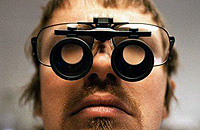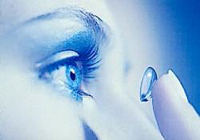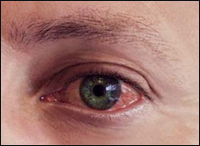Glasses - this is an optical device for vision correction. It consists of spectacled lenses and rims. It would seem that everything is simple, but in fact, choose good glasses a rather difficult task. What you need to know by buying glasses?
Content
Before ordering glasses, you should check the vision of the doctor - the eyepiece, and get one, two or three recipes on the disease, depending on the disease, the kind of activity (driver, operator of the computer, dentist, accountant, and t.D.) or wearing glasses. At the same person, depending on the above indicators, there may be various intercentrons and diopter, respectively.
It is unacceptable to order points only according to the results of a computer examination without additional consultations with the doctor. Also extremely harmful to the eye to constantly wear ready-made glasses, bought in a random place - temporary counters, in transitions and metro, in the markets. When buying such glasses, attention is paid only to the appearance of the rim, the quality of optics is not even discussed.
What happens if bought «wrong» Points where optical indicators (diopters and intercentronear distance) are not met, or spectacle lenses are made of low quality material? The process of addiction begins, in which the body is trying to compensate for optical distortions (aberrations) at the cost of overworking the eyes, headaches and further impairment of sight.
Speed lenses
It is speaking lenses that compensate for the refraction violations that are the reason for your poor view. Therefore, choosing glasses, you must first choose the correct lenses correctly. So, what you need to know by choosing speaking lenses:
Optical indicators (intercentrose distance, diopter) - This data should give you a selection specialist after a full examination of your vision. Of course, glasses need to be ordered only in specialized departments of pharmacies or salons of optics, where there is confidence that these indicators will be accurately observed.
 Point refractive index (index) - The most important point of the grade lenses. The general rule is the higher the index, the less the thickness and curvature of the lens giving the same diopters. And the stronger lenses you need, the noticeable difference. In practice, this means that the lenses with a high index will be easier, they will be less distorting your eyes and face, it will be easier for them to choose a thin and stylish frame. At modern lenses, the index varies - for optical glass in the range of 1.5 - 1.9, and for optical plastic - in the range of 1.5 - 1.7. Lenses with an index close to 1.5 are considered low-index, and with an index more than 1.6 - high-index.
Point refractive index (index) - The most important point of the grade lenses. The general rule is the higher the index, the less the thickness and curvature of the lens giving the same diopters. And the stronger lenses you need, the noticeable difference. In practice, this means that the lenses with a high index will be easier, they will be less distorting your eyes and face, it will be easier for them to choose a thin and stylish frame. At modern lenses, the index varies - for optical glass in the range of 1.5 - 1.9, and for optical plastic - in the range of 1.5 - 1.7. Lenses with an index close to 1.5 are considered low-index, and with an index more than 1.6 - high-index.
Material Point lenses - Currently, the choice lies between glass and plastic. Definitely the advantage cannot be given not to other lenses. Plastic, like material, much softer glass, and more vulnerable to damage. But all modern high-quality plastic lenses are produced with a hardening coating, which makes them as resistant against scratches, like glass.
Advantages of plastic lenses - This is lightness - the specific weight of the optical plastic is twice the glass, and therefore your glasses with plastic lenses will be much easier. Less attendant than glass, since plastic is more resistant to splitting and its fragments are less dangerous - therefore it is recommended to children, elderly people and drivers. Plastic gives great handoff possibilities, in particular for staining lenses.
Advantages of glass lenses - In general, the refractive index (index) of glass lenses is higher than plastic. In addition, the strength (except shock) in glass is higher than that of plastic. This means that high-quality glass lenses, with equal diopters, can be thinner and flat than plastic.
Anti-reflex The coating is a special technology that significantly improves the optical properties of the glacier lens. Anti-reflex increases the transparency of the lenses by 8-10%. Due to the greater transparency and lack of visual interference lenses with anti-reflex, more comfortable for eyes and cause less fatigue with visual loads. In the dark, the lenses with anti-reflex allow you to better see the wheel.
Thus, the choice of points is worth starting with the choice of glasses lenses, especially if the correction of a high degree of myopia or hyperopia is required.
Rubbing
Right glasses should be worthy «change» Your high-quality glasses lenses. What you need to know by choosing a frame for glasses:
Rim can cause allergic reactions. When choosing a rim, pay attention to the predisposition to allergies. Cheap metal rims of unknown origin can cause severe allergic reactions and irritations on the skin of the face.
Rim must be convenient - When choosing a rim, it is necessary to pay special attention to such details as the mobility of the noseofer - rigid noseopors are often put on the nose and cause rapid fatigue. It is advisable to choose a rim with soft and movable (silicone) nose-resistant. The size of the towers should strictly correspond to the distance from the rim before convexity after the ear shell. Housing knife should not put pressure on whiskey and the ear. With a large face, it is desirable to pick up a rim with spring hinge. Rubbing should be convenient and not cause fatigue even with long use.
Rubbing should like. The correctly selected frame is important in creating a person's image and style.









